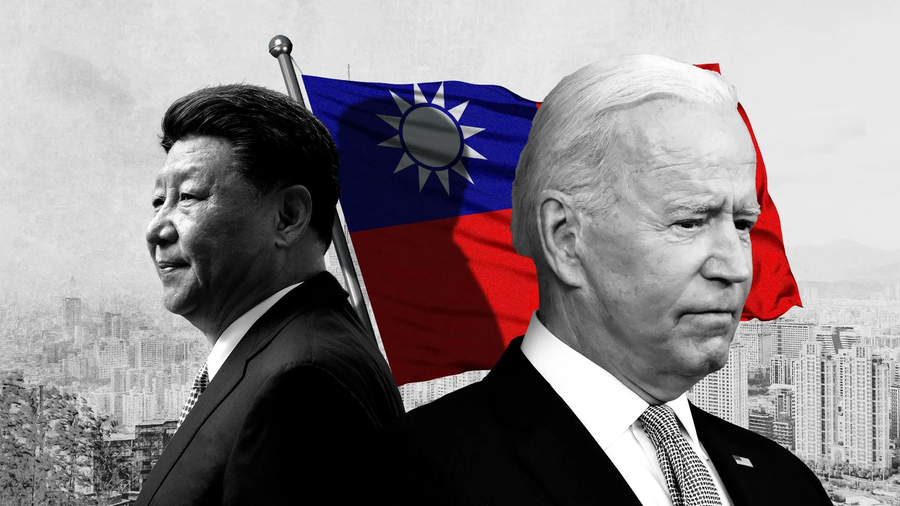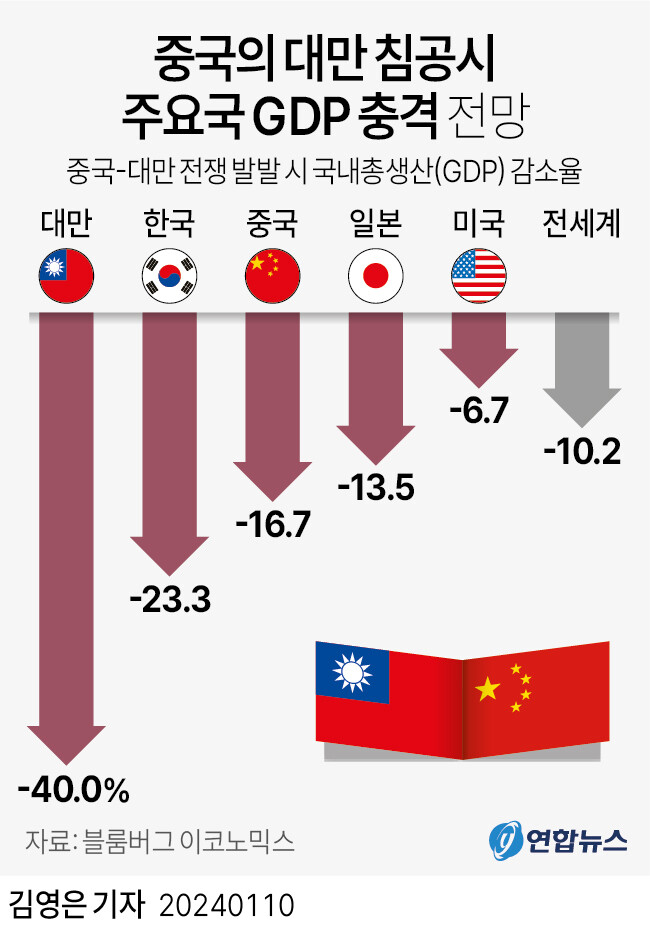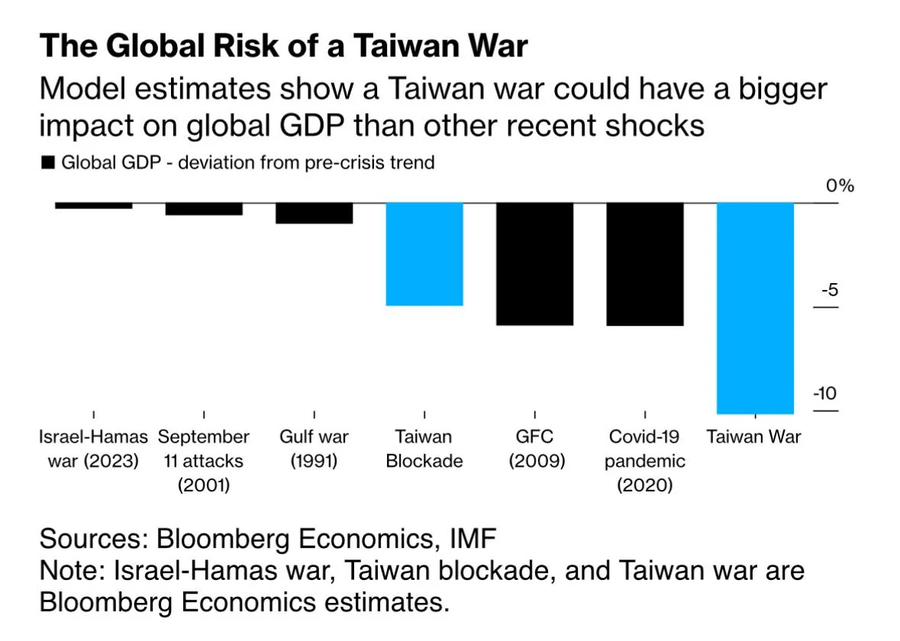블룸버그 분석…"GDP 충격 대만 40%↓·中 17%↓·세계 10%↓"
"세계경제 미칠 충격 10조 달러…팬데믹·금융위기 훨씬 능가"
(뉴욕=연합뉴스) 이지헌 특파원 = 중국이 대만을 침공할 경우 세계경제 국내총생산(GDP)이 10조달러(약 1경3천조원) 감소하는 경제적 충격이 발생할 수 있다는 미국 민간 연구기관의 추산이 나왔다.
특히 중국-대만 전쟁 발발 시 한국의 GDP가 20% 넘게 감소하면서 전쟁 당사국인 대만에 이어 두 번째로 경제적 피해 규모가 클 것으로 전망됐다.
경제연구기관인 블룸버그 이코노믹스(이하 블룸버그)는 대만의 지정학적 위기 격화와 관련, 전쟁이 발발한 경우와 전쟁 없이 중국이 대만 봉쇄에 나선 경우 등 2개 시나리오로 나눈 뒤 그에 따른 경제적 충격을 이처럼 분석했다고 블룸버그 통신이 9일(현지시간) 보도했다.
우선 중국이 대만을 침공하고 미국이 이에 개입하는 전쟁 발발 시나리오에서 대만이 입는 경제적 피해는 GDP의 40%에 달할 것으로 블룸버그는 추산했다.
블룸버그는 "해안에 집중된 대만 인구와 산업시설은 전쟁 발발 시 인명 피해와 더불어 경제적 비용을 늘릴 수 있다"라고 지적했다.
전쟁 당사국인 중국의 경제적 피해는 GDP의 16.7%에 달할 것으로 추산됐다.
미국 등 주요 무역 상대국과의 관계가 끊기고, 첨단 반도체에 대한 접근이 불가능해지기 때문이라고 블룸버그는 분석했다.
미국 역시 애플 등 주요 기업들이 중국과 대만의 공급망에 의존도가 높은 상황에서 전쟁으로 인한 경제적 피해가 GDP의 6.7%에 달할 것으로 추산됐다.
세계경제에 미치는 충격은 GDP의 10.2%에 해당하는 10조달러에 달할 것으로 블룸버그는 내다봤다.
2020년 코로나19 확산이나 2009년 글로벌 금융위기가 그 해 세계경제의 GDP를 5.9% 감소하는 충격을 미쳤는데 중국-대만 전쟁의 경제적 충격은 그보다 훨씬 클 수 있다는 게 블룸버그의 평가다.
블룸버그는 특히 "한국, 일본 등 동아시아 국가들에 가장 큰 충격을 미칠 것"이라며 한국의 GDP가 23.3% 감소할 것이라고 추산했다.
당사국인 대만(-40.0%)에 이어 한국이 입는 경제적 타격이 두 번째로 클 수 있다는 경고다. 이는 일본(-13.5%)은 물론 전쟁의 또다른 당사국인 중국(-16.7%)보다도 큰 피해다.
블룸버그는 반도체 산업과 무역 및 금융 충격 측면에서 경제적 피해를 추산했다고 설명했다.
한편 전쟁 없이 중국이 대만 봉쇄에 나서는 시나리오에서는 경제 피해 규모가 전쟁 시나리오보다는 적을 것으로 추산됐다.
봉쇄 상황에서 GDP 감소 규모는 대만이 12.2%, 중국이 8.9%, 미국이 3.3% 수준일 것으로 블룸버그는 추산했다. 세계경제 GDP의 피해 규모는 5%로 판단했다.
다만, 블룸버그는 "경제 충격은 가정된 시나리오에 따라 상당히 달라질 수 있으며, 불확실성 범위도 넓다"며 "전쟁이나 봉쇄의 기간이 짧고 반도체 공급망과 무역에 미치는 영향이 크지 않은 경우 충격은 더 적을 수 있다"라고 말했다.
이어 "(오는 13일 예정된) 대만 총통 선거 결과가 당장의 위기를 촉발하지는 않더라도 향후 양안 관계의 방향을 결정짓게 될 것"이라고 평가했다.

출처 : Mirae Asset Minutes (24년 1호)
===============================================================
(Bloomberg) Xi, Biden and the $10 Trillion Cost of War Over Taiwan
Taiwan’s election highlights the potential for a conflict that would decimate the global economy.
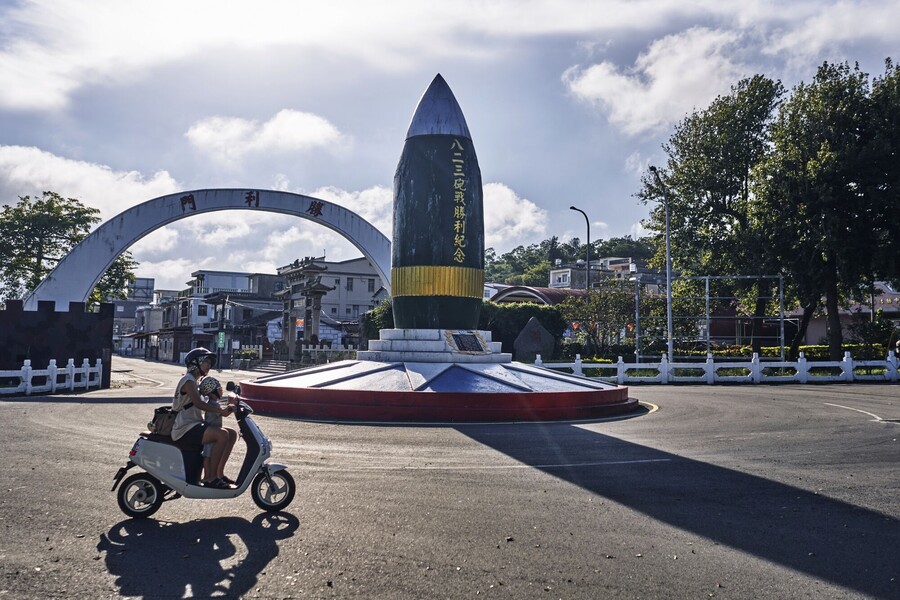
A memorial statue for the Second Taiwan Strait Crisis in Kinmen, Taiwan.
Photographer: An Rong Xu/Bloomberg
By Jennifer Welch, Jenny Leonard, Maeva Cousin, Gerard DiPippo, and Tom Orlik
2024년 1월 9일 오전 9:00 GMT+9
War over Taiwan would have a cost in blood and treasure so vast that even those unhappiest with the status quo have reason not to risk it. Bloomberg Economics estimate the price tag at around $10 trillion, equal to about 10% of global GDP — dwarfing the blow from the war in Ukraine, Covid pandemic and Global Financial Crisis.
China’s rising economic and military heft (=clout), Taiwan’s burgeoning sense of national identity, and fractious relations between Beijing and Washington mean the conditions for a crisis are in place. With cross-Strait relations on the ballot, Taiwan’s Jan. 13 election is a potential flashpoint.
Xi Jinping, right, departs talks with Joe Biden in California on Nov. 15.
Photographer: Li Xueren/Xinhua/Getty Images
Few put a high probability on an imminent Chinese invasion. The People’s Liberation Army isn’t massing troops on the coast. Reports of corruption in China’s military cast doubts on President Xi Jinping’s ability to wage a successful campaign. US officials say tensions eased somewhat at the November summit between President Joe Biden and Xi, who pledged “heart-warming” measures to woo foreign investors.
Still, the outbreak of war in Ukraine and Gaza are reminders of how long-simmering tensions can erupt into conflict. Everyone from Wall Street investors to military planners and the swathe of businesses that rely on Taiwan’s semiconductors are already moving to hedge against the risk.
National security experts in the Pentagon, think tanks in the US and Japan, and global consulting firms are gaming out scenarios from a Chinese maritime “quarantine” of Taiwan, to the seizure of Taiwan’s outlying islands, and a full-scale Chinese invasion.
Jude Blanchette, a China expert at the Center for Strategic and International Studies, says interest in a Taiwan crisis from multinational firms he advises has “exploded” since Russia’s 2022 invasion of Ukraine. The subject comes up in 95% of conversations, he said.
Russia’s invasion of Ukraine, and the semiconductor shortage as the world reopened from Covid lockdowns, provide a small glimpse of what’s at stake for the global economy. The impact of war in the Taiwan Strait would be far bigger.
Taiwan makes most of the world’s advanced logic semiconductors, and a lot of lagging edge chips as well. Globally, 5.6% of total value added comes from sectors using chips as direct -nputs — nearly $6 trillion. Total market cap for the top 20 customers of chip giant Taiwan Semiconductor Manufacturing Co. is around $7.4 trillion. The Taiwan Strait is one of the world’s busiest shipping lanes.
Modeling the Cost of a Crisis
Bloomberg Economics has modeled two scenarios: a Chinese invasion drawing the US into a local conflict, and a blockade cutting Taiwan off from trade with the rest of the world. A suite of models is used to estimate the impact on GDP, taking account of the blow to semiconductor supply, disruption to shipping in the region, trade sanctions and tariffs, and the impact on financial markets.
For the main protagonists, other major economies, and the world as a whole, the biggest hit comes from the missing semiconductors. Factory lines producing laptops, tablets and smartphones — where Taiwan’s high-end chips are the irreplaceable “golden screw” — would stall. Autos and other sectors that use lower-end chips would also take a significant hit.
Barriers to trade and a significant risk-off shock in financial markets add to the costs.
In the case of a war:
● Taiwan’s economy would be decimated. Based on comparable recent conflicts, Bloomberg Economics estimates a 40% blow to GDP. A population and industrial base concentrated on the coast would add to the human and economic cost.
● With relations to major trade partners turned off and no access to advanced semiconductors, China’s GDP would suffer a 16.7% blow.
● For the US, further from the center of the action but still with a lot at stake — through the reliance of Apple on the Asian electronics supply chain, for example — GDP would be down 6.7%.
● For the world as a whole, GDP would be down 10.2%, with South Korea, Japan and other East Asian economies most impacted.
A key assumption in this scenario is that the US would succeed in enlisting allies in concerted and severe economic sanctions against China.
US officials say that the Chinese reaction to then-US House Speaker Nancy Pelosi’s visit to Taipei in August 2022 helped convince other Group of Seven countries that the risk of conflict is real. Beijing saw it as a shift in the status quo that made Xi appear weak, particularly after domestic commentators suggested that China would be able to stop her from landing in Taipei.
The fallout from the Pelosi visit, which saw China conduct large-scale naval drills seen as practice runs for a blockade, helped build diplomatic muscle memory for concerted reactions, the US officials said.
“China’s rhetoric and the People’s Liberation Army response to Pelosi’s visit triggered a wave of quiet corporate contingency and scenario planning,” said Rick Waters, managing director of the China practice at Eurasia Group and formerly the top China policy official at the State Department.
Bloomberg Economics also modeled what a yearlong blockade of Taiwan by mainland China would mean for the global economy:
● For China, the US, and the world as a whole, GDP in the first year would be down 8.9%, 3.3% and 5% respectively.
The reason for the smaller impact relative to the war scenario is that while the global economy still loses access to all of Taiwan’s chips, other shocks — including tariffs between the US and its allies and China, the disruption to Asian shipping and financial market fallout — are scaled down.
The Bloomberg Economics exercise is — as far as we are aware — unique in bringing together geopolitical and economic modeling expertise. Still, the results are significantly driven by the scenario assumptions, and the band of uncertainty is wide. A war or blockade of shorter duration, and with less significant disruptions to semiconductor supply and trade, would have a smaller impact.
A Consequential Election
Even if the outcome of Taiwan’s election doesn’t trigger an immediate crisis, it will define the direction of cross-Strait relations.

Lai Ching-te campaigning in Kaohsiung on Jan. 8.
Photographer: Yasuyoshi Chiba/AFP/Getty Images
Lai Ching-te (라이칭더) — currently serving as vice president in the Democratic Progressive Party (민진당) administration — has been at pains to present himself as a continuity candidate, with no plans to disturb relations with Beijing.
In the past, though, he described himself as a “pragmatic worker for Taiwanese independence.” For Beijing, which views the island as part of its territory, any formal push for independence would cross a red line. At his meeting with Biden, Xi expressed deep concern about the possibility of a Lai win, according to a senior administration official.
The DPP counterpoint, which aligns with the assessment in Washington, is that Beijing’s belligerence is the problem — not Taiwan’s desire for continued autonomy.
Lai’s opponents — Hou Yu-ih of the Kuomintang (허우유이, 국민당) and Ko Wen-je of the Taiwan People’s Party (커원저, 민중당) — are both promising pragmatic steps to improve relations with Taiwan’s giant neighbor, without sacrificing the island’s de facto independence.
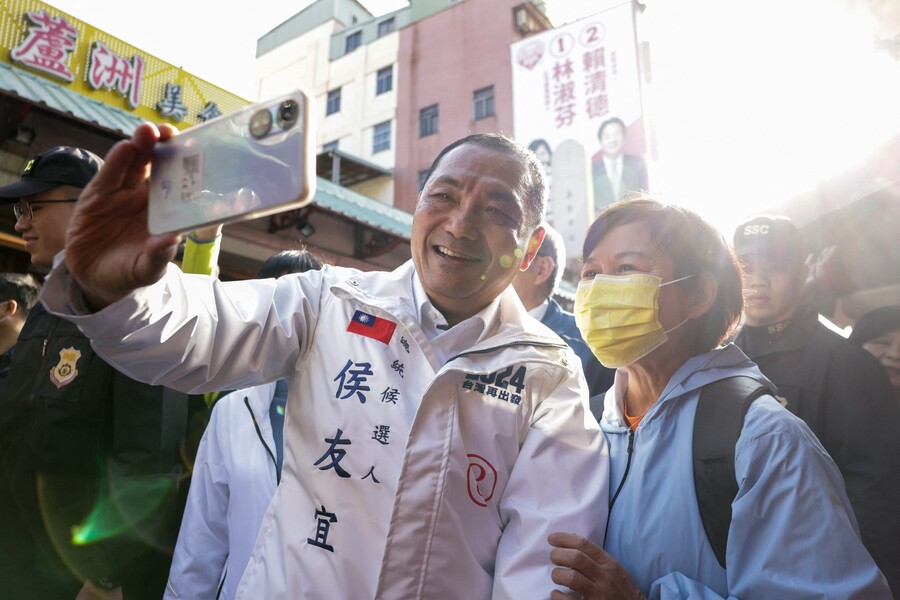
Hou Yu-ih, left, on the campaign trail in New Taipei City on Jan. 5.
Photographer: I-Hwa Cheng/AFP/Getty Images

Ko Wen-je arrives at an election rally in Kaohsiung on Jan. 7.
Photographer: Alastair Pike/AFP/Getty Images
US officials say China may be planning a multipronged reaction to the election, with military incursions, economic sanctions and grey zone tactics like cyber-attacks.
Officials in Washington and Taipei say the period from the election in January to inauguration of the new president in May is a danger zone for Chinese actions aimed at hemming in Taiwan’s next president.
Straitened Circumstances
Whoever wins will have to deal with a changed, and challenging, set of cross-Strait realities.
In 1979, when the US switched diplomatic recognition from Taipei to Beijing, US GDP was ten times that of China, China’s military was in the early stages of modernization, and Taiwan was still under single-party rule.
Fast forward to today and China’s GDP has closed much of the gap with the US, its military boasts near-peer status — especially close to home — and Taiwan’s liberal democracy is a visible contrast to China’s authoritarian system.
Statements by leaders in Beijing and Washington have added to the tension.
Xi has said more than once that Taiwan is not an issue that can be “passed down generation after generation.” Along with his efforts to modernize the military, those statements have spurred speculation he wants to deliver unification on his watch, with 2027 cited as a danger year by US intelligence and military officials.
At his meeting with Biden, Xi vented frustration with the view that China’s forces are aiming at readiness for an invasion by 2027, which he said was mistaken, according to a senior US official.
For his part, Biden has said the US would come to Taiwan’s aid in the event of a Chinese invasion. That bluntness eroded layers of carefully crafted ambiguity about the US p-osition (미국의 대만에 대한 전략적 모호성), stoking anger in China and concerns the US is emboldening pro-independence boisterousness.
Bloomberg Economics’ Taiwan stress index — based on warning words used by China’s Ministry of Foreign Affairs and military incursions in Taiwan’s air defense identification zone (방공식별구역) — shows the temperature over the last year and a half elevated.
Investors and businesses are already preparing for the worst. Kirk Yang, chairman of equity investment fund Kirkland Capital and an expert on Asia technology firms, says the fund’s p-osition in Taiwan is now close to zero. Geopolitical tensions have “added incentive to scale back investments at a faster pace” he said.
He’s in good company. Legendary investor Warren Buffett sold down his stake in TSMC in the first quarter of 2023, citing geopolitical risk as the reason.
Businesses and governments are also making preparations. Greenfield investment in electronics and electrical equipment rocketed to $181 billion in 2022 from $48 billion in 2020 as governments in the US, Japan and Germany opened their wallets to diversify sources of semiconductor supply.
If there’s an upside from the Bloomberg Economics analysis, perhaps it’s this: The $10 trillion cost of a crisis would be so high for all players that the incentive to avoid it is strong.
The status quo might be no one’s ideal outcome, but for Taipei, Beijing and Washington the alternatives are worse. That’s a reason Taiwan’s ambiguous autonomy might remain an equilibrium outcome, even as the conditions that make it so shift.
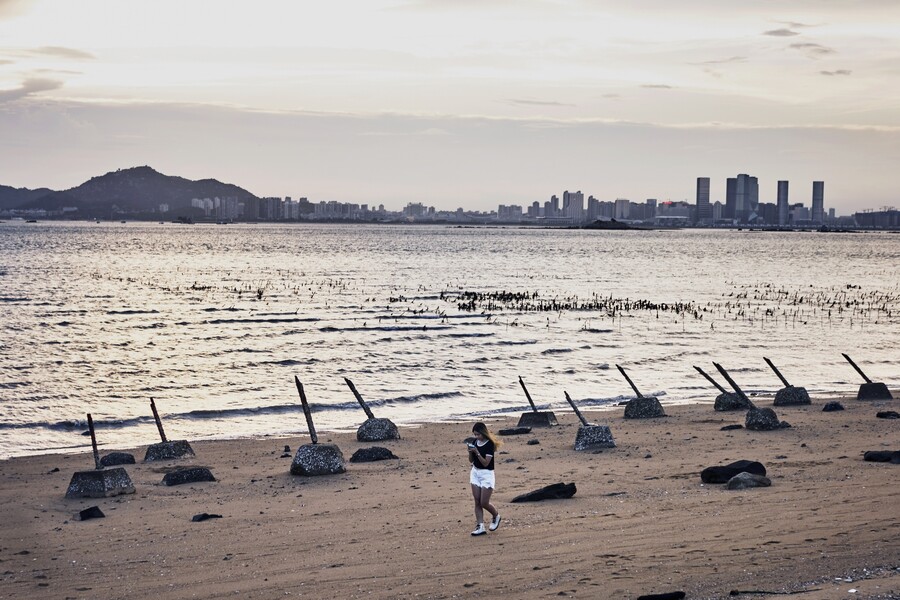
Anti-landing barriers on the Taiwanese islands of Kinmen, across from Xiamen in mainland China.
Photographer: An Rong Xu/Bloomberg



